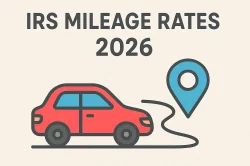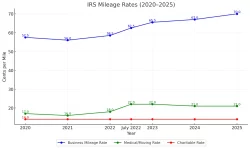IRS Mileage Guide
Home » Mileage Tax Deduction » Medical Mileage
Last Updated: January 5, 2026
Are you regularly driving out of medical necessity? You might be surprised to learn that those miles can turn into valuable tax deductions! The medical mileage rate lets you deduct the cost of using your personal vehicle for eligible medical purposes, saving you money at tax time. It’s a key benefit for U.S. taxpayers. Let’s dive into how you can claim this deduction and keep more of your hard-earned cash.

Table of Contents
Understanding Medical Mileage
Navigating the world of tax deductions can feel complex, but claiming medical mileage doesn’t have to be. It’s all about understanding the rules and keeping good records.
What Qualifies as Medical Mileage?
Medical mileage specifically refers to the miles you drive for necessary medical care. This includes trips to doctors, dentists, therapists, pharmacies, hospitals, and even support groups for specific medical conditions. It’s not just for you; you can claim miles for a dependent you are taking to appointments, too.
2026 IRS Medical Mileage Rate
The IRS sets a standard rate each year for medical deductions. The medical mileage rate for 2026 is 20.5 cents per mile, a 0.5-cent decrease from the 2025 mileage rate of 21 cents per mile. This means if you drive 500 miles for approved medical trips in 2026, you could claim a $102.5 deduction.
Who is Eligible to Claim?
You can claim medical mileage deductions if your total out-of-pocket medical expenses (including your mileage) exceed 7.5% of your Adjusted Gross Income (AGI). This means if your AGI is $50,000, your medical expenses must be more than $3,750 ($50,000 x 0.075) before you can start deducting.
How to Claim Your Medical Miles
There are two ways to claim your medical mileage:
The Medical Mileage Rate
This is the easiest and most common way. You simply multiply your eligible miles by the IRS-published rate. Most taxpayers choose this because it’s simpler, and it may lead to more tax savings if you have relatively low vehicle costs.
Actual Expenses Method
With this method, you deduct the actual expenses spent on gas and oil directly related to your medical travel (among the other deductible medical expenses). However, you cannot include general car expenses like depreciation, insurance, or repairs.
You may also deduct parking fees, tolls, bus tickets, taxi, ambulance, etc., separately as itemized deductions, regardless of which method you choose.
Filing for your Medical Mileage Deduction
To deduct medical mileage on your tax return, you must itemize your deductions using Schedule A (Form 1040) instead of taking the standard deduction. First, calculate your qualifying medical trips, noting the number of miles driven. Then, choose one of two methods: either multiply the medical miles by the IRS medical mileage rate or calculate the actual cost of gas and oil used for those trips. Add the resulting dollar amount to your other eligible medical expenses. You can only deduct the portion of your total medical expenses that exceeds 7.5% of your Adjusted Gross Income (AGI). After subtracting that threshold, report the deductible amount on Line 1 of Schedule A.
There’s no separate form for mileage; it’s included as part of your overall medical expense entry. Keep detailed records in case the IRS requests documentation.
Important Considerations for Your Claim
To make sure your claim is valid, remember these points:
- Documentation is Key: The IRS requires detailed records. You need to keep your refueling receipts related to medical trips or keep a detailed log of your miles. In this case, log the date of each trip, the destination, the purpose, and the number of miles traveled. Keep other proofs, such as medical papers and doctors’ notes as additional proof. Missing documentation is the number one reason deductions get denied during an audit.
- Trip Purpose: The trip must be specifically for medical care. A quick stop at the grocery store on the way home, for instance, wouldn’t count towards medical mileage.
- Insurance Coverage: This tax deduction is for out-of-pocket expenses. If your insurance reimburses you for medical travel, you can’t also claim it as a tax deduction.
Watch this video walkthrough of medical mileage reimbursement in California helps you get the full picture.

MileageWise: Your Solution for Effortless Medical Mileage Tracking
Now that you understand the ins and outs of medical mileage, you might be thinking, “How can I possibly keep track of all this easily and accurately?” That’s where MileageWise comes in. We offer smart solutions designed to make your life simpler and your mileage logs audit-proof.
Mobile App for Medical Mileage & Expense Tracking
- Quick Setup: Start tracking in minutes: no tech skills needed, so you can focus on your health.
- Automatic Mileage Tracking: Log medical trips with ease. Hands-free and accurate.
- Backup Mileage Capture: The app can pinpoint your starting point any time, unlike other trackers.
- Flexible Routing/Distance Calculations: Choose to track every mile or an optimized mileage calculation.
- Expense Tracking Integration: Keep receipts and mileage all in one place — ready for deduction.
- Ad-Free & Privacy-Focused: No ads, no data selling. Your health-related travels stay private and secure.
- Routing Integration with Waze: Navigate safely while the app logs your trips, with just one tap.
Dashboard for Reviving Past Trips
- AI-Powered Mileage Wizard: Reconstructs your missed drives, helping you claim every eligible mile.
- Google Maps Timeline Integration: Forgot to track a trip to your doctor or the pharmacy? Recover past travel history using your Google Location data.
- Bulk Client & Trip Import: Set the trips you previously logged in excel or upload destinations in bulk to save time.
- IRS Compliance Auditor: Automatically checks your log against IRS rules and checks for audit red flags, so you stay audit-ready for deductions.
- Comprehensive Trip Management: Set recurring trips, label them by purpose, edit in batches, and manage multiple vehicles or users.
Lifetime Plans for Ongoing Medical Mileage Needs
For those with regular medical visits, treatments, or caregiving duties, MileageWise is the only mileage tracking app that offers lifetime plans. No monthly fees, no subscriptions. Pay once and track your health-related trips for life.
- Small Lifetime Deal: Log unlimited miles for medical visits, and generate reports with AI help, all for a one-time payment of $119. Perfect for individuals needing a simple, reliable solution without recurring costs.
- Gold Lifetime: Unlock every feature: track both past and present trips, import Google Timeline history, and produce IRS-compliant mileage logs. Ideal for managing multi-year deduction records or long-term care responsibilities.
Support That Understands Your Needs
Whether you’re managing chronic care travel or assisting a loved one, our team understands how important accurate tracking is. From setup to report generation, you’ll get quick, practical help.
Try MileageWise for free for 14 days. No credit card required!
Success Story: How a User Took Control of her Medical Mileage
I have a rare condition that means regular long drives to medical appointments. When I get home I’m always drained, with no energy left to records my mileage. I knew I was missing out on deductions.
That’s when I found MileageWise. The app’s automatic tracking changed everything. I use the vehicle movement recognition mode, and it logs every trip in the background without me lifting a finger. Now I am finally claiming the deductions I deserve, and I don’t lament over missed miles anymore.
Conclusion
Don’t leave money on the table when it comes to your medical mileage deduction. It’s a legitimate way to reduce your tax burden. Take charge of your finances with these simple steps:
- Understand the Rules: Know if you qualify and what expenses are deductible.
- Keep proper records: Accurate documentation is your best friend.
- Choose the Right Method: The standard medical mileage rate is usually easiest.
- Use Smart Tools: Leverage technology like MileageWise for accuracy and compliance.
- Seek Expert Help: Consult a tax professional if your situation is complex.
FAQ
What is the IRS medical mileage rate for 2026?
The IRS medical mileage rate for 2026 is 20.5 cents per mile. This is the rate you can use to calculate deductible costs of driving your car for medical purposes.
What trips qualify for medical mileage deduction?
You can deduct mileage for trips made primarily for medical care, such as doctor visits, hospital visits, therapy, dental appointments, and picking up prescriptions. The trip must be primarily for, and essential to, medical care for yourself, your spouse, or a dependent.
Who is eligible to claim the medical mileage deduction?
Taxpayers who itemize deductions on their federal income taxes may be eligible to claim medical mileage if their total qualified medical expenses exceed 7.5% of their adjusted gross income (AGI).
How do I calculate my deduction for medical mileage?
Multiply the total number of miles driven for qualified medical purposes by the IRS standard medical mileage rate. Any parking fees and tolls related to that travel can be deducted separately.
How do I report medical mileage on my tax return?
Report your total qualified medical expenses, including medical mileage, on Schedule A when you itemize deductions. Keep detailed records of your mileage and the medical purpose for each trip.




